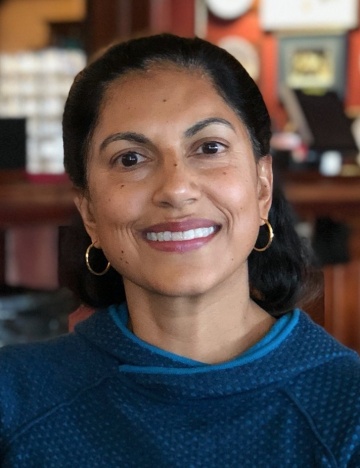Columbia College | Columbia University in the City of New York
Take Five with Dr. Divya Singh ’87, GSAS’88

What were you like when you arrived at Columbia?
I was all over the place. I arrived in the spring term of freshman year, having deferred admission due to financial issues. Once I finally got to the College, I was ready to let loose. I had been a serious and strait-laced student in high school, attending an all-girls boarding school in Connecticut. I had never dated, drank or pulled an all-nighter. Like many students, I thought of college as a time to reinvent myself. My newly adapted persona was that of a party girl, always looking for fun and adventure.
I was also determined to take full advantage of the academic offerings, like a kid in a candy store. I arrived undecided about a major, taking honors calculus, French literature and American government in my first semester. I was a mediocre student my first few terms (see “party girl,” above) but I improved once I settled down and focused on my classes. I ultimately majored in English literature with a minor in history.
What do you remember about your first-year living situation?
Despite arriving mid-year, I quickly adapted to the social scene on Carman 5; it was a coed floor with a diverse group of characters. There were engineers, football players, artists and pre-meds from around the country. Our idiosyncrasies were not only tolerated, but embraced. I remember countless hours hanging out in the lounge (MTV on in the background), talking, eating, drinking — the usual shenanigans. My freshmen friends introduced me to NYC culture, including the best art house movie theaters, dance clubs and thrift shops.
My suitemates and I were a tight-knit group. I think I pushed them out of their comfort zones, and they moderated my excesses. They had my back when I got into potentially unsafe situations. I learned a lot about accountability, kindness and trust that year.
What Core class or experience do you most remember and why?
The Core was one of the reasons I went to Columbia (the other was to be part of the first fully coed class). I remember going to the Frick as part of an Art Humanities assignment, comparing and contrasting paintings by Titian, Rembrandt and Holbein. During Music Humanities I went to a performance of Beethoven’s Symphony No. 7 at the Manhattan School of Music. We were fortunate to experience so much of the art firsthand, something that can happen only in New York.
I loved the interdisciplinary survey courses, so much so that I took two additional colloquia that dove deep into the Western Canon (classes I dubbed the “Super Core”). One was “The Classical World” with Robert Belknap SIPA’57, GSAS’59; the other, “The Middle Ages and the Renaissance,” with James Mirollo GSAS’61. They were two of my favorite gentleman-scholars.
The Core continues to be a part of my life — all of the books are still on my shelves. When I started my surgical practice, I reread Sophocles’s Oedipus Rex, a lesson in hubris and humility. Dante’s Inferno calls to me periodically when I think about my path and how best to live life. I read Emily Wilson’s new translation of The Odyssey while I was in Sicily, kayaking around the Cyclops Islands. The Core Conversations virtual book club gave me a reason to revisit Crime and Punishment and The Iliad, and I recently read If Beale Street Could Talk for the first time. I read surgical textbooks to be a better orthopedic surgeon; the Core provides guidance on how to be a better human being.
Did you have a favorite spot on campus, and what did you like about it?
I thought of New York City as the college campus. Most of my social life was away from campus. If I was on site, it was either eating, studying or sleeping. My weekend routine involved meeting a friend for breakfast at one of the local diners (e.g. Tom’s or The Mill) and discussing philosophy over a huge breakfast. The quantity of food was enough to tide me over until dinner; the conversation was to inspire me for the studying that followed. Other favorite haunts were The Hungarian Pastry Shop, Amir’s and V&T.
I have always been a library nerd. Butler was the workhorse, vast and impersonal, and SIPA was good for occasional group study. But my favorite was the Avery Architectural and Fine Arts Library, a quiet and light-filled sacred space. I was the most productive there.
What, if anything, about your College experience would you do over?
Money was always a worry. I spent too many hours on work-study, sacrificing study time (I certainly wasn’t going to compromise my social life!). I should have lightened up and taken out more loans. Little did I know that my relatively small college debt would soon be overshadowed by massive medical school debt.
Before I went to Columbia, I was a serious dance student, but I stopped dancing freshman year. I regret not remaining physically active. Some form of exercise would have helped me mentally and academically. My physician self cringes at my college habits (poor sleep hygiene, garbage diet, too much alcohol). Fortunately, I’ve gotten wiser and healthier since then.

